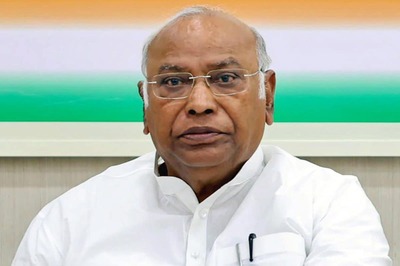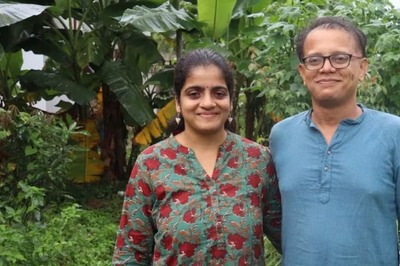
views
Washington: The Group of 20 nations on Friday stood ready to commit at least $400 billion to bulk up the International Monetary Fund, though Brazil wants to tie the cash to a pledge that emerging market voting power at the IMF will increase.
The IMF has been aiming to raise at least $ 400 billion - a doubling of its lending capacity - to ensure it has enough firepower to respond if Europe's debt crisis escalates.
"We have been aiming at around $ 400 billion or beyond, and I am confident we will reach this objective in the G20 meeting today (Friday)," EU Economic and Monetary Affairs Commissioner Olli Rehn told.
A G20 official familiar with a draft of the communique the group of advanced and emerging countries was preparing for release on Friday said that there would be "firm commitments to increase resources available over $ 400 billion."
Russia also said the G20 was ready at a meeting on Friday to pledge enough new funds to meet IMF chief Christine Lagarde's $ 400 billion target. She said earlier this week the IMF had already secured about $ 320 billion from Europe and Japan.
"Trust me that the G20 will announce the final amount. This will be an amount that will satisfy the management of the International Monetary Fund," said Sergei Storchak, Russia's deputy finance minister. He said Russia would offer $ 10 billion.
Support from Russia, China and Brazil has been seen as crucial to double the IMF's war chest so it has the resources it might need to aid countries that face fallout from Europe. An international diplomat said that in all, emerging nations have lined up at least $ 100 billion.
The IMF has warned that the euro zone's debt crisis presents the gravest risk to the global economic expansion, and financial markets worry that Spain and Italy may next require bailouts, following Greece, Ireland and Portugal.
At a dinner on Thursday, top finance officials from G20 countries spent most of their time talking about the economic outlook and the travails in the euro zone, with a heavy focus on the difficult path Spain faces to cut its budget deficit and retain market confidence, a G20 source said.
Enlarging the IMF's coffers could offer solace to nervous investors that any widening of the crisis could be contained. Lagarde said on Thursday she expects to seal a deal on fresh funds at the World Bank/IMF meetings this weekend.
But Brazil said that as a condition for funds, emerging powers want fresh pledges to recognize their fast-growing global economic weight written into the G20 communique. They are frustrated over delays - particularly in the United States - in implementing an agreement to lessen Europe's sway at the IMF and lift China into the No. 3 voting slot.
"What we want and demand in every meeting is that this commitment be reaffirmed," Brazilian Finance Minister Guido Mantega said on Thursday after a meeting of officials from the so-called BRICS nations - Brazil, Russia, India, China and South Africa.
Mantega drove the point even more forcefully in a speech prepared for delivery on Saturday to the IMF's steering committee, saying it was no longer enough to simply repeat that voting reforms are crucial for the effectiveness of the IMF.
"Progress on this front has been limited and slow," he will say, according to the text.
Canada, meanwhile, was pushing against Europe's dominance on the IMF's 24-member board when dealing with the rescue funds. It proposed European board members decide how to use Europe's share of the financing, and if the amount pledged by non-Europeans was also needed, then non-European members should be allowed to set the loan conditionality on that portion of the aid.
This drive reflects growing concern among non-European countries over the fairness in the global lender's dealings with Europe. The region has the largest single bloc on the IMF board and the Fund is headed by a French woman.
While a commitment on increased funds appeared near to being sealed, a full detailing of country-by-country commitments was likely to wait. The international diplomat said some countries may need to get final approval from their capitals.
China could contribute $ 60 billion, matching Japan's pledge, although Beijing had not finalized the number. Saudi Arabia would chip in a little less than China, while Russia and Brazil were likely to contribute between $ 10 billion and $ 20 billion each, the diplomat said.
This would easily reach the marker of at least $ 400 billion set by Lagarde. The firewall would complement the $ 1 trillion in emergency funds for Europe agreed upon by the EU leaders last month, which was another precondition for countries bolstering the IMF resources.




















Comments
0 comment